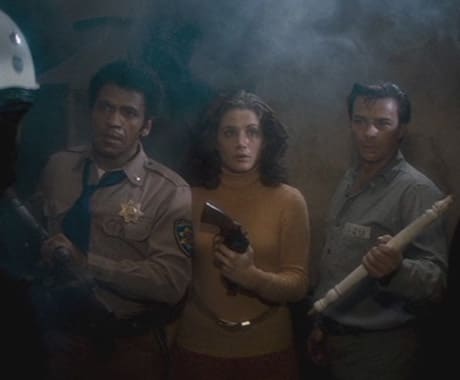If creating a feature film on a shoestring budget is about making the most of what you have, then John Carpenter's Assault on Precinct 13 should be heralded as an absolute triumph of ingenuity. Taking the framework of the western Rio Bravo and substituting the cliché of the police officer who's about to retire with a police station that's about to be closed down, it's a gritty blast of action and suspense that showcases the raw talents of its director.
In Anderson, a seedy ghetto in South Central Los Angeles, violent gangs roam the streets wreaking havoc. The story shifts focus initially from young officer Bishop (Austin Stoker), who is ordered to man the remaining shell of Precinct 13, to a group of criminals on death row being transferred to another prison, including the smart-mouthed Wilson (Darwin Joston) and imposing Wells (Tony Burton). Meanwhile, the members of the menacing Street Thunder gang are bound to honour a blood pact when one of their members is shot dead by a father who was forced to retaliate after they killed his daughter.
When the bus carrying the criminals makes an unscheduled stop at Precinct 13 due to an illness and the catatonic father takes refuge from the gang members inside the station, they're forced to defend against the armed mass lurking outside. In the process, strange allegiances are born between cop and criminal: Wilson's quick wit and tenacity start to grow on Bishop, while chemistry begins to develop between Wilson and the station's attractive secretary, Leigh (Laurie Zimmer).
As Carpenter notes in the commentary track, everything happens a little slower than he feels it should have in retrospect (something he chalks up to a constant need to pad the running time), and it's a little hard to swallow how the massive gang never seems to figure out that they should just all swarm the police station at once, but there is great pleasure in the details. For instance, the way Wilson and Leigh settle for consummating their flirtations with Leigh providing him with the cigarette he so desperately craves is oddly tender, and Carpenter's score — one he reveals was based at least in part on Led Zeppelin's "Immigrant Song" — is gloriously cheesy but suitably ominous in its use of primitive synthesizers from the era.
The best of the supplemental material is pretty much all of the special features that involve Carpenter, from his commentary track to a Q&A he did with Stoker at a theatre in 2002. In the latter, he is forthcoming and at times even a little curt or dismissive at some of the admittedly inane questions being offered from his fawning fans. He declares the film to be apolitical, despite the prescience of the gang warfare being depicted in his L.A., and then tells a funny story about how he avoided a fight with the MPAA by submitting the film to them without a shot they had asked him to cut; he simply reinserted it upon the film's release.
(Shout! Factory)In Anderson, a seedy ghetto in South Central Los Angeles, violent gangs roam the streets wreaking havoc. The story shifts focus initially from young officer Bishop (Austin Stoker), who is ordered to man the remaining shell of Precinct 13, to a group of criminals on death row being transferred to another prison, including the smart-mouthed Wilson (Darwin Joston) and imposing Wells (Tony Burton). Meanwhile, the members of the menacing Street Thunder gang are bound to honour a blood pact when one of their members is shot dead by a father who was forced to retaliate after they killed his daughter.
When the bus carrying the criminals makes an unscheduled stop at Precinct 13 due to an illness and the catatonic father takes refuge from the gang members inside the station, they're forced to defend against the armed mass lurking outside. In the process, strange allegiances are born between cop and criminal: Wilson's quick wit and tenacity start to grow on Bishop, while chemistry begins to develop between Wilson and the station's attractive secretary, Leigh (Laurie Zimmer).
As Carpenter notes in the commentary track, everything happens a little slower than he feels it should have in retrospect (something he chalks up to a constant need to pad the running time), and it's a little hard to swallow how the massive gang never seems to figure out that they should just all swarm the police station at once, but there is great pleasure in the details. For instance, the way Wilson and Leigh settle for consummating their flirtations with Leigh providing him with the cigarette he so desperately craves is oddly tender, and Carpenter's score — one he reveals was based at least in part on Led Zeppelin's "Immigrant Song" — is gloriously cheesy but suitably ominous in its use of primitive synthesizers from the era.
The best of the supplemental material is pretty much all of the special features that involve Carpenter, from his commentary track to a Q&A he did with Stoker at a theatre in 2002. In the latter, he is forthcoming and at times even a little curt or dismissive at some of the admittedly inane questions being offered from his fawning fans. He declares the film to be apolitical, despite the prescience of the gang warfare being depicted in his L.A., and then tells a funny story about how he avoided a fight with the MPAA by submitting the film to them without a shot they had asked him to cut; he simply reinserted it upon the film's release.
